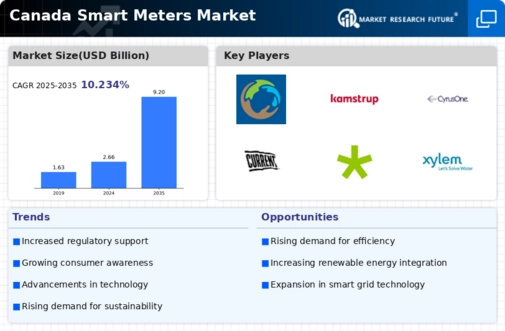Enhanced Energy Efficiency
The drive towards enhanced energy efficiency is a pivotal factor in the Canada smart meters market. Smart meters facilitate real-time monitoring of energy consumption, allowing consumers to adjust their usage patterns accordingly. This capability is particularly relevant as Canada aims to reduce greenhouse gas emissions by 30 percent below 2005 levels by 2030. The integration of smart meters has been shown to lead to energy savings of approximately 10 to 15 percent, which not only benefits consumers financially but also contributes to national sustainability goals. As more provinces adopt smart meter technology, the overall energy efficiency landscape in Canada is expected to improve significantly, further propelling the growth of the smart meters market.
Consumer Awareness and Engagement
Consumer awareness and engagement are becoming increasingly important in the Canada smart meters market. As consumers become more informed about energy consumption and its environmental impacts, there is a growing demand for technologies that provide transparency and control over energy usage. Smart meters empower consumers by offering detailed insights into their energy consumption patterns, enabling them to make informed decisions. Surveys indicate that approximately 70 percent of Canadians are interested in using smart meters to manage their energy usage more effectively. This heightened consumer interest is likely to drive the adoption of smart meters across the country, fostering a more energy-conscious society.
Growing Demand for Data Analytics
The growing demand for data analytics is transforming the Canada smart meters market. Smart meters generate vast amounts of data regarding energy consumption patterns, which can be analyzed to optimize energy distribution and improve customer service. Utilities are increasingly leveraging this data to develop predictive maintenance strategies and enhance operational efficiency. According to recent estimates, the market for smart meter data analytics in Canada is projected to reach CAD 1 billion by 2027. This trend indicates a shift towards data-driven decision-making in the energy sector, which is likely to drive further investments in smart meter technologies and analytics platforms.
Government Incentives and Policies
Government incentives and policies play a crucial role in shaping the Canada smart meters market. Various provincial governments have implemented programs to encourage the adoption of smart meters, recognizing their potential to modernize the energy grid. For instance, the Ontario Energy Board has mandated the installation of smart meters for all residential customers, which has resulted in over 5 million smart meters deployed across the province. These initiatives not only promote energy conservation but also enhance grid reliability. Furthermore, federal funding programs aimed at supporting smart grid technologies are likely to bolster market growth, as they provide financial backing for utilities to invest in smart meter infrastructure.
Integration with Smart Home Technologies
The integration of smart meters with smart home technologies is a significant driver in the Canada smart meters market. As the Internet of Things (IoT) continues to expand, consumers are increasingly seeking solutions that allow for seamless connectivity between their energy management systems and smart home devices. Smart meters can be integrated with home automation systems, enabling users to monitor and control their energy consumption remotely. This trend is expected to grow, with the smart home market in Canada projected to reach CAD 10 billion by 2025. The convergence of smart meters and smart home technologies not only enhances user experience but also promotes energy efficiency, thereby driving the growth of the smart meters market.






















